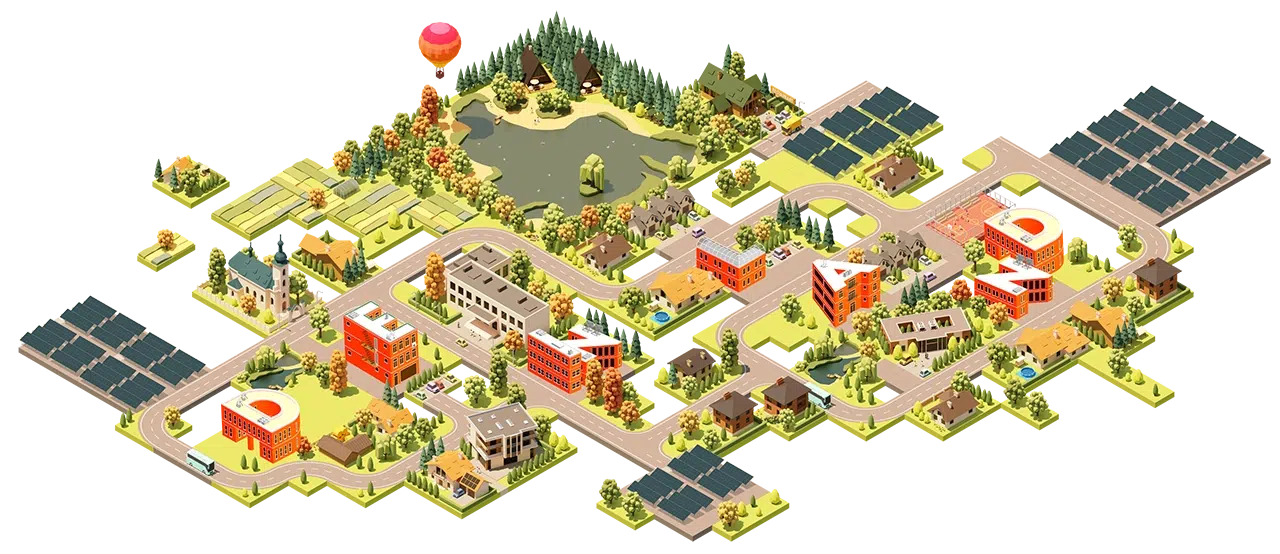Land-PV
The construction of solar installations on green spaces, agriculturally disadvantaged areas, as well as conversion areas, is essential for the transformation of Germany and an important component for the further realization of the energy transition. Deinland sees itself as a partner for landowners, farmers, and municipalities.
The future of Germany lies on your land
Deinland’s focus is on developing medium-sized solar installations in the range of 3-5 MWp. With this system size, we aim to promote the decentralization of energy production in rural areas while also achieving optimal integration into the landscape, preserving the region’s scenic value.
When planning ground-mounted solar parks, it is essential to consider the local flora and fauna to avoid disturbances to the biological balance. Instead, by integrating ecological corridors and green spaces (flower strips) into the system layout, biodiversity should be encouraged.
The goal must be to convert ground-mounted solar installations into bio-reserves, providing smaller wildlife and insects with a protected habitat. In this way, we want to create retreats for animals or a space where the diversity of species, from both an animal and plant perspective, can develop more intensively.
Our “Land-PV” product is designed with these aspects in mind, ensuring that we achieve the highest level of acceptance among the local population when constructing medium-sized solar installations. Only together, and with the necessary degree of prudence, will we be able to implement the energy transition at the required speed.
For green spaces
We understand green spaces as agriculturally disadvantaged and fallow land. The use of fallow or low-yielding land can be a sensible use, as the agricultural added value is limited. In this respect, these areas can make an important contribution to decentralized energy production in rural environments.
For the respective farmers, the alternative use for energy production represents an additional source of income that would otherwise not be available for these areas. Taking into account the described measures to promote biodiversity, we see the use of agriculturally disadvantaged land as a very good opportunity to realize locally oriented energy production.
The use of agricultural land for energy production can make sense within the framework of implementing Agri-PV systems, ensuring that the agricultural benefit of high-yielding arable land is maintained. However, energy production in rural areas should not diminish agricultural production on high-yielding soils.
For conversion areas
Within the scope of the Land-PV product, Deinland develops photovoltaic systems on conversion areas, which include used, developed, and partially sealed land areas. These include industrial wastelands, contaminated sites, decommissioned commercial areas, or landfills. Depending on their previous use, these areas have various parameters to consider when reusing them.
In general, the use of conversion areas for energy generation based on PV systems represents a very good third-use option. As these are usually areas that have already been used and developed, the existing infrastructure, such as access roads or connections to the power grid, can be reused. The installation of PV modules can be the only sensible way of reuse, especially for contaminated sites.
Our approach is to consider the promotion of biodiversity as the highest priority, even for conversion areas. The integration or replanting of flora and the settlement of fauna is significantly more challenging in conversion areas. However, Deinland will also explore new ways to implement this approach in this area segment.
Let’s convert the suns energy wherever we can

Characteristics Land-PV
Promote decentralization
By choosing the size of the PV system, Land-PV promotes decentralized energy generation for municipalities, as well as regional energy independence at the community level.
Strengthen biodiversity
Strengthening biodiversity and creating bio-reserves as a nucleus for increasing animal and plant species diversity is our top priority.
Support farmers
By implementing solar installations on agriculturally disadvantaged areas, farmers generate income from leasing, which exceeds agricultural revenues.
Involve municipalities
Deinland involves municipalities in electricity production at the legally allowed upper limit of 0.2ct/kWh according to the German Renewable Energy Act (EEG) 2023.
.
Increase acceptance
In addition to the conceptual design of the PV systems in terms of their applied size and strong focus on biodiversity, citizens are involved in the process at an early stage.
Utilize conversion areas
The use of conversion areas offers the opportunity for resource-efficient energy production on already used and partially sealed surfaces.
Promote agriculture
The construction of solar installations in rural areas must not result in the loss of high-yielding land for agricultural production.
Accelerate implementation
In order to achieve our expansion goals, and above all our climate goals, the approval process for solar installations at the municipal level must be accelerated.